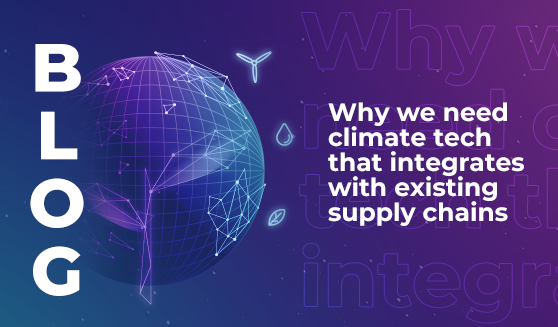
Why sustainability is the heart of the smart city revolution
The smart cities of the future will use tech to lower emissions, cut urban temperatures, and improve quality of life in highly populated areas.


In 2023, the number of climate tech deals declined by 12% year-on-year to USD $12.5 billion – but the average deal size increased by 17%. This suggests that there’s a growing focus on large-scale projects that can have a more significant impact on market development and emissions; and climate tech continues to be the primary viable solution to climate challenges around the world.
Each time we’ve welcomed climate tech innovators at LEAP, we’ve heard about ambitious projects – like the Nvidia Omniverse Platform, which uses an AI neural network simulator powered by a supercomputer to generate a realistic and interactive digital twin of Earth.
But alongside those super-scope projects that could provide a broad view of problems and solutions, there’s a clear need for climate tech that can integrate seamlessly into existing supply chains across industries. New tech is difficult, costly, and time-consuming to roll out if it requires a supply chain to change significantly. But when it can sit comfortably within existing systems, it can become operational (and effective) much more quickly.
Speaking on a podcast for Tahaluf’s food and beverage industry event, InFlavour, Barbara Belvisi (Founder and CEO at Interstellar Lab) described how her company creates sustainable, scalable supply chain solutions for plant products.
Belvisi highlighted that one of the critical benefits of Interstellar Lab’s approach is that their highly innovative solutions to growing plant molecules don’t require an overhaul of company supply chains. Instead, Interstellar can fit neatly within its clients’ existing structures – providing them with the same plant molecules they’ve already been buying, but with fewer steps from production to distribution; and with more consistent availability and more reliable quality.
“So we’re not replacing,” Belvisi said, “we are integrating within the existing supply chain.”
In doing so, Interstellar Labs solves an important pain point for its clients (providing high quality and consistently available plant ingredients with a lower carbon footprint) while making it easy for those clients to adopt this new solution.
This is an approach that makes sense for climate tech, too. The industries that need climate tech the most (because they need to reduce their emissions the most) are large-scale, fast-paced, and cumbersome. The cost and operational challenges involved in adopting new technologies or changing any element of their supply chain is often prohibitive – and without the agility to change quickly, experiment, and fail fast, progress towards more climate-efficient solutions can be slow.
When we interviewed Tan Wooi Leong (Managing Director, Energy & Industrial at Surbana Jurong) about his perspective on progress in energy transformation, he said:
“Governmental support in policy formulation towards environmental friendly practices will drive businesses to do more, and public sentiment towards environmentally friendly products with a willingness to pay for them will also concurrently drive their adoption. All hands must clap together in order to see more significant progress.”
And across energy and beyond, if that government support and organisational willingness to adopt climate-friendly solutions is coupled with straightforward supply chain integration, the barriers standing in the way of climate tech rollout will be reduced.
We’re not against radical transformation. But when companies are limited in how much they can change (and how fast), climate tech developers could have an impact more quickly if they design products and services that don’t require old supply chains to be thrown out in favour of new ones.

The smart cities of the future will use tech to lower emissions, cut urban temperatures, and improve quality of life in highly populated areas.

Discover the cities that rank highly for smart city preparedness, and learn why locally relevant innovation is more important than cutting-edge tech.

If you’ve ever thought about becoming a tech investor, read this – learn why investors are the quiet force shaping the future of the industry.

The smart cities of the future will use tech to lower emissions, cut urban temperatures, and improve quality of life in highly populated areas.

Discover the cities that rank highly for smart city preparedness, and learn why locally relevant innovation is more important than cutting-edge tech.

If you’ve ever thought about becoming a tech investor, read this – learn why investors are the quiet force shaping the future of the industry.